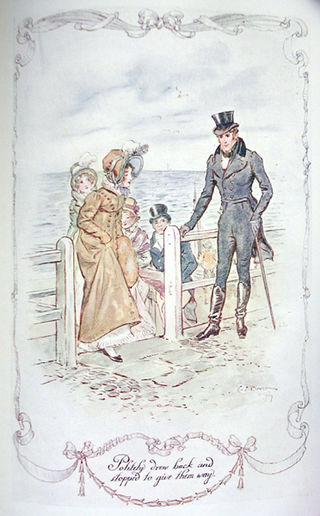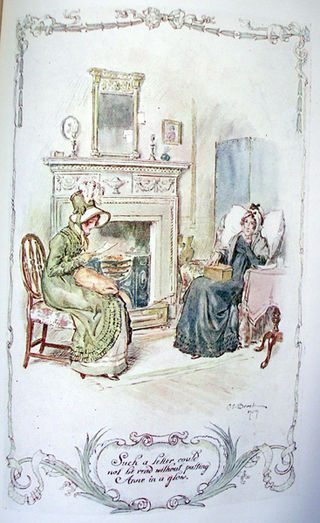Empathy
"Beyond the Reach of Justice or Compassion"
Jane Austen's Mr. Elliot is a psychopath of the charming, dangerous ilk.
Posted January 18, 2019
Antisocial Personality Disorder (APD), also known as psychopathy and sociopathy, is one of the “Cluster B” personality disorders as designated in Diagnostic and Statistical Manual-Fifth Edition (DSM-5), the “bible” of American psychiatry. These disorders have also been characterized as empathy disorders by Simon Baron-Cohen, which explains why Jane Austen would have portrayed them in her novels. Although she died when the first edition of the DSM was 135 years away, Austen nevertheless understood the importance of empathy in social and moral terms. She also observed that some people lacked this trait to an alarming degree.
Empathy means thinking and feeling from someone else’s perspective, walking “a mile in their shoes,” as the saying goes. It consists of a cognitive element known as “Theory of Mind,” which means being able to being able to infer what what another person is thinking. Its other part is emotional, being able to feel what someone else is feeling. If you can do this, it means you understand and identify with their feelings. In that case, inflicting pain becomes difficult if not impossible because hurting someone else becomes to some extent like hurting yourself. People with APD lack the emotional component of empathy, although their cognitive capabilities might well be intact.
While APD is characterized by deficits in the capacity for emotion, it divides into more and less controlled versions. Some people with the condition can’t govern their impulses, and they lash out at others with little provocation, and often violently. They can be irritable, aggressive and impulsive, behaving with total disregard for their own safety as well as the safety of others. No one in Austen’s novels fits this profile. Others with APD are coldly manipulative, conning other people into giving them what they want. They might still wish to harm or dominate, but they have better powers of self control. To make matters worse, they can be charming, which makes them dangerous.
The psychiatrist Hervey M. Cleckley (1903-1984) coined the term “high Machiavellians” (high Machs, for short) to refer to people who demonstrate this latter, manipulative version of APD. The manipulative individual with APD does indeed fit the profile of the perfect politician, self-interested and unscrupulous, described in Niccolo Machiavelli’s The Prince (1532). In any case, people afflicted with APD routinely disregard the feelings and violate the rights of others. They flout social norms, in some instances by committing crimes. Not only do the afflicted fail to establish attachments to others, but they are also relatively indifferent to human connection.
Mr. Elliot, Anne Elliot’s charming and heartless cousin (Persuasion), is certainly a high Mach. Although he is heir to the Elliot title and estate, Anne is unacquainted with him at the start of the novel. Ten years earlier, when Anne had been away at boarding school, Mr. Elliot had been in constant touch with Anne’s family, raising hopes of a marriage between himself and Anne’s older sister, Elizabeth. He suddenly abandoned the family without explanation, although we learn that he detested them and didn’t want to forego his profligate, dissolute lifestyle in order to appear sufficiently respectable to marry his cousin. And he didn’t care about the rank (of baronet) he was due to inherit. However, later in life, he comes to value the prestige he formerly spurned, and for this reason, Mr. Elliot rekindles his relationship with Anne’s branch of the family.

While he pays particular attention to Anne, whom he finds very attractive, his goal is to try to prevent Sir Walter (Anne’s father) from marrying and producing an heir, thereby eclipsing his chance of joining the nobility.
Anne learns the truth about Mr. Elliot’s character from her friend Mrs. Smith, a former classmate, now a widow in poor health, who is impoverished because Mr. Elliot led her husband to financial disaster and now refuses to help her gain the small amount of money she might have due to her. Her description of him is spot-on for a person with APD:
Mr. Elliot is a man without heart or conscience; a designing, wary, cold-blooded being, who thinks only of himself; who, for his own interest or ease would be guilty of any cruelty, or any treachery, that could be perpetrated without risk of his general character. He has no feeling for others. Those whom he has been the chief cause of leading in to ruin, he can neglect and desert without the smallest compunction. He is totally beyond the reach of any sentiment of justice or compassion.
There you have it: lack of empathy, lack of feeling, complete self-absorption, a person unable to care for others.
High Machs are smooth operators, and their charming, normal façade enables them to deceive and manipulate by gaining trust. But the façade is not perfect. Lacking the capacity to feel empathy entails a related deficit: the person with APD can’t read emotions intuitively. Not everyone who experiences low empathy or a lapse in empathy has this deficit—empathy is often a matter of attention and will. But psychopaths clearly have defects in the capacity for processing emotions. High Machs understand others by learning to recognize emotions and what they mean to people. They won’t empathize with a person who is sad—that is, feel sadness on her behalf—but they know how to recognize sadness and understand what this means to someone and how it might make them behave.
This knowledge, what we might call a “cognitive override,” is likely to be less accurate than intuitive processing. Think of this with an analogy. Once you know a dance really well, let’s say a quadrille (just to stay in Austen’s era, but you can think about driving if you wish!), the knowledge becomes second nature. You don’t have to think to perform the dance. But when you’re first learning, you have to think of every move. It’s much more likely that a novice will make a mistake than an experienced dancer.
People with APD are always learning to choreograph emotions. Certain perceptions might become automatic, such as recognizing sadness in situations likely to produce this feeling. But recognizing and predicting people’s responses to new or surprising situations is much more difficult. If you can’t empathize, it’s difficult to predict an emotional response in circumstances that you haven’t previously encountered or learned about.
And so we see this with Mr. Elliot. Because he lacks intuitive knowledge of many common emotional responses, he sometimes miscalculates the effects of his behavior. For instance, he tells Anne that he has heard someone praise her, and that he knows of her virtues not only from personal observation, but from information that preceded their acquaintance. Anne realizes they must have a friend in common; this turns out to be Mrs. Smith, whose dire situation is his fault. If Mr. Elliot had possessed any sense of how a person of integrity—and normative emotional responses—would react to hearing about his behavior towards the Smiths, he would not have mentioned this connection. He would have steered away from saying anything that might lead Anne to ask Mrs. Smith about him, or to suggest a connection between them. He obviously doesn’t have a clue about how knowledge of his behavior would affect Anne.

Early on in their acquaintance, Anne briefly considers marrying Mr. Elliot, although she rejects the idea long before she knows the truth about his character. Even when she still thinks well of him, she finds something amiss: “Mr. Elliot was rational, discreet, polished, but he was not open. There was never any burst of feeling, any warmth of indignation or delight, at the good or evil of others.” Mr. Elliot has desires and opinions, but not the kinds of feelings needed for authentic relationships. People with APD exploit rather than relate.
Indeed, blunted feelings characterize APD to a greater extent than we find in the other “Cluster B” disorders, Narcissistic Personality Disorder (NPD) and Borderline Personality Disorder (BPD). There’s a protective factor here; psychopaths don’t know or care about what they’re missing, unlike those afflicted with these other disorders, who become distressed when defenses break down. But that doesn’t make the condition any less sad: People with APD miss out on some of the most rewarding aspects of being human, indeed, of being a mammal. This insensibility not only impoverishes their own lives, but also makes them hazardous to others.
References
American Psychiatric Association (2013). Diagnostic and Statistical Manual of Mental Disorders, Fifth Edition. Washington D. C., American Psychiatric Publishing.
Austen, Jane (2003). Persuasion. New York: Penguin Books. (Original work published 1818)
Baron-Cohen, Simon (2011). The Science of Evil: On Empathy and the Origins of Cruelty. New York: Basic Books.




